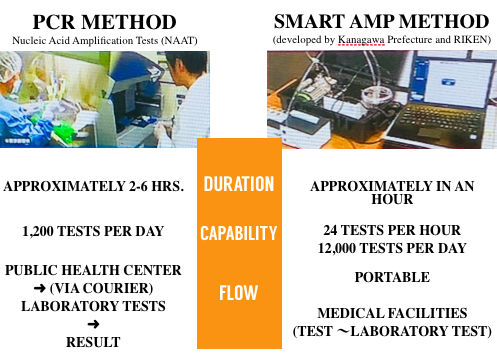- Christmas Market at the Yokohama Red Brick Warehouse returns
- Roppongi Hills Christmas Market
- Upcoming VenusFort farewell events before it closes down for good.
- November NO-admission-fee days at the Snoopy Museum
- The Royal Park Hotel Kyoto invites families to book its Marble room this fall.
- Grand Central Oyster Bar offers the best of the fall season.
- The Tokyo Sky Tree is Ready for Christmas
- Kimono and Athleisure. Do they go together?
- Shimokitazawa’s Curry Festival Is Back and Bigger Than Ever
- Tokyo’s Christmas Market in Hibiya Park Returns
Japan’s Kanagawa prefecture’s coronavirus test is significantly quicker..
- Tweet
-
- Pin It
WHO-endorsed Nucleic Acid Amplification Tests (NAAT), a method that detects the SARS-CoV-2 virus by polymerase chain reaction (PCR), is one of the most commonly used coronavirus tests.
In a NAAT method, the specimen collected from the upper respiratory tract using nose/throat swab techniques is multiplied with polymerases and brought to a specialized laboratory for amplification. Detection is done using “primers” to target specific sections of genome to show if SARS-CoV-2’s RNA, its specific genetic material is present in a patient’s body. If a test comes back positive, it means there was SARS-CoV-2 viral RNA in the specimen collected from the patient.
Another test called serological is performed to detect antibodies present in blood serum. Antibodies are proteins produced by white blood cells to fight foreign bodies such as antigens. A serological test helps detect the rate of infection in a community as well as the patient’s immune response.
Although highly reliable, the problem with the current process is that it can take up anywhere between 2-6 hours.
Kanagawa prefecture and RIKEN, Japan’s largest research institution specializing on a diverse range of scientific disciplines, has jointly developed a new method called SmartAmp (also referred to as Kanagawa model) which can detect SarsCov-2 in an hour or less. Quick detection of the virus and timely response can make a big difference in a rapidly evolving situation. According to Kanagawa’s official website, the three key features of the SmartAmp are:
- Virus detection is significantly quicker. 24 specimens can be tested in 1 hour.
- Less susceptible to virus mutations.
- Changing reagents to respond to virus mutations. (Reagents are the main ingredients of any chemical-based test which includes inorganic mixtures of enzymes, probes, and primers created to mimic the coronavirus’s genome.)
Currently, inspection is all being done through the prefecture’s public health centers. To streamline the testing process, Kanagawa will shift inspection to medical institutions so that it can concentrate on preventing the spread of infection by contact and cluster-tracing.
- Tweet
-
- Pin It
About Julie Wilson
Related Posts
Latest News
-
Christmas Market at the Yokohama Red Brick Warehouse returns
The Christmas season is when German-style festive markets come into...
- Posted 1 day ago
- 0
-
Roppongi Hills Christmas Market
The German style Christmas market returns to the roofed area...
- Posted 1 day ago
- 0
-
Upcoming VenusFort farewell events before it closes down for good.
A massive redevelopment at Palette Town will be taking place...
- Posted 1 day ago
- 0
-
Echire now accepting orders for Buche de Noel
Echiré French brand is possibly the only fancy butter chefs...
- Posted 5 days ago
- 0
-
FDA approves Pfizer vaccine for children in the 5-11 age group
The Food and Drug Administration on Friday authorized Pfizer and...
- Posted 1 week ago
- 0
-
Toy Story Hotel set to open in Spring 2022 at Tokyo Disney Resort
Artist rendering of the Toy Story Hotel at Tokyo Disney...
- Posted 1 week ago
- 0
-
New dads who take 6 months paternity leave are losers, says private equity investor
Palantir cofounder Joe Lonsdale, an American venture capitalist is under...
- Posted 1 week ago
- 0
-
Japan’s Education Minister Wants Class Size Reduced
Japan’s Education minister Shinsuke Suematsu who assumed his role on...
- Posted 1 week ago
- 0
-
November NO-admission-fee days at the Snoopy Museum
From November 3 until 8, guests can enjoy no-admission-fee days...
- Posted 1 week ago
- 0
-
The Royal Park Hotel Kyoto invites families to book its Marble room this fall.
There’s a reason the most-visited staycation destination for Tokyoites in...
- Posted 2 weeks ago
- 0
-
Japan survey finds vaccine immunity level wanes over time in fully vaccinated people especially the elderly
A survey by Soma city in Fukushima reveals the amount...
- Posted 3 weeks ago
- 0
-
The Disney musical film “Encanto” will be released on November 26, 2021.
“Encanto” is the first computer-animated musical fantasy comedy film by...
- Posted 4 weeks ago
- 0
-
Jon Kent, the son of Superman, is gay in new comics.
The Superboy, Jonathan Kent, son of Clark Kent and Lois...
- Posted 4 weeks ago
- 0
-
UK Children March to Buckingham Palace to Deliver Petition
On Saturday, TV presenter and naturalist Chris Packham led 100...
- Posted 4 weeks ago
- 0
-
Michelin-starred Sushi train restaurant opens in Omotesando
Ginza Onodera, a Michelin-starred restaurant known for sushi and tempura...
- Posted 4 weeks ago
- 0
-
Tokyo’s Christmas Market in Hibiya Park Returns
Pencil this in. From December 10 (Friday) until Christmas day ...
- Posted 4 weeks ago
- 0
-
Shonan Candle Illumination
You know the autumn isn’t officially here unless the Shonan...
- Posted 4 weeks ago
- 0
-
Pierre Hermes collaborates with Sanrio’s Hello Kitty
November 1st is the birthday of Hello Kitty, Japan’s beloved...
- Posted 1 month ago
- 0
-
The Strings Omotesando is taking orders for surprise cakes.
The Strings Omotesando is gearing up for the Christmas cake...
- Posted 1 month ago
- 0
-
Facebook puts Instagram Kids project on pause amid mental health concerns
The head of Instagram Adam Mosseri said Monday it will...
- Posted 1 month ago
- 0
-
Emergency status extended in Tokyo and 18 prefectures
Japan extends emergency status over the novel coronavirus pandemic in...
- Posted 2 months ago
- 0
-
Doctors warn: Milk Crate TikTok Challenge Can Cause Terrible Injury
If you have children at home, you probably have heard...
- Posted 2 months ago
- 0
-
Meet the Teenpreneurs who just sold their first startup.
Two teen coders from Seattle, Sage Khanuja, 17, and Nikolas...
- Posted 3 months ago
- 0
-
The important life skills children learn in a Karate class.
Karate is in itself both an art form and sport....
- Posted 3 months ago
- 0
-
Skin irritation from prolonged mask wearing? Here’s a fix.
While it it important to continue wearing a mask for...
- Posted 4 months ago
- 0
-
A Giant Digital Art Garden is Happening at the Tokyo Midtown
Families may not be able to watch the Tokyo...
- Posted 4 months ago
- 0
-
Feeling Nearly Normal
For the first time in 15 months, I hugged a...
- Posted 4 months ago
- 0
-
The Vegan Ramen here is delicious.
As many ramen restaurants in Japan are discovering since the...
- Posted 4 months ago
- 0
-
Steamed Chicken salad with baby potatoes and lettuce
Using a simple olive oil, roasted garlic and lemon instead...
- Posted 5 months ago
- 0
-
Anna Umemiya misses the greatest dad in the world.
Although the life of model, tv personality and product endorser...
- Posted 5 months ago
- 0
-
Study reveals Vegetarians and Pescatarians are less likely to get seriously ill from covid than meat eaters
A new case study, published in the BMJ Nutrition, Prevention...
- Posted 5 months ago
- 0
-
Why I think Tokyo Disneyland attracts more adults than kids.
While being one of the most profitable imports from the...
- Posted 8 months ago
- 0
-
Moomin Valley Park features 1,200 umbrellas this spring.
Being around 1,200 colorful umbrellas offer a respite from pandemic...
- Posted 9 months ago
- 0
-
When is the right time to go back to work after having a baby?
Having a baby is exciting, exhausting, and expensive. At some...
- Posted 9 months ago
- 0
-
Japan to stop giving child benefit to high-Income families
Currently, Japan pays a ¥5,000 child allowance as benefit...
- Posted 9 months ago
- 0
-
Life is too short to miss out on these tantalizing desserts.
It’s no understatement to say that not only do the...
- Posted 9 months ago
- 0
-
Japan’s amended Paternal leave may start in October 2022
When Japanese environment minister, Shinjiro Koizumi announced that he was...
- Posted 9 months ago
- 0
-
Japan’s Immigration Bureau warns foreigners about impostor scammers posing as immigration officials
Impostor scams can cost you money, cause identity theft and...
- Posted 10 months ago
- 0
-
Registration for entrance examinations to national and public universities nationwide begins today.
A total of 98,896 students aiming to be admitted to...
- Posted 10 months ago
- 0
-
The most expensive steak sandwich in Japan
Are you ready to spend money on the most expensive...
- Posted 10 months ago
- 0
-
Top 10 Kitchen Essentials People Are Buying in Japan
As the pandemic sway more families into eating at home,...
- Posted 10 months ago
- 0
-
Mom in California dies from Covid after giving birth
Vanessa Cardenas Gonzalez, a 33-year old mom in California died...
- Posted 10 months ago
- 0
-
Keisei Skyliner reserves front car of train for travelers
The Keisei Electric Railway that operates the Keisei Limited Express...
- Posted 10 months ago
- 0
-
“Don’t undercook your meat,” reminds Japan’s health authorities.
With the feasting season upon us, many families will be...
- Posted 11 months ago
- 0
-
How to make a chunky, delicious Clam Chowder kids love.
It’s officially winter. ‘Tis the season for soup -...
- Posted 11 months ago
- 0
-
Why UK Scientists fear New COVID-19 mutant virus may easily infect children.
Up until now, researchers believed children under the age of...
- Posted 11 months ago
- 0
-
Japan tightens restrictions on passengers entering the country from the U.K.
Responding to the threat posed by the highly contagious new...
- Posted 11 months ago
- 0
-
Japan’s recent case count increases slowly but consistently.
According to this week’s COVID update by the World Health...
- Posted 11 months ago
- 0
-
Romain Vandendorpe breaks world record for immersing himself in ice cubes for the longest time.
On December 19, 2020, a 34-year old Frenchman Romain Vandendorpe...
- Posted 11 months ago
- 0
-
WHO Health for All Film Festival invites film-makers to join the film competition
The WHO Health for All Film Festival invites independent film-makers, production companies,...
- Posted 11 months ago
- 0
-
Fuji-Q Highland’s new observation deck to give visitors a premium view of Mount Fuji
The roller coaster at Fuji Q Highland will be closed...
- Posted 11 months ago
- 0
-
Six million light bulbs shine on Sagamiko Pleasure Forest this season
Japan’s largest illumination event, the Sagamiko Pleasure Forest illumination has...
- Posted 11 months ago
- 0
-
2020 Open Innovation Lounge hosted by Hyundai includes Finland-based startup
FLEXOUND Augmented Audio™ was invited to Hyundai Motor Group’s 2020...
- Posted 11 months ago
- 0
-
How to make a French style mocha eclair at home.
Although the pandemic has forced families to keep holiday celebrations...
- Posted 11 months ago
- 0
-
Where to watch dancing sardines in Japan.
Hakkejima Sea Paradise in Yokohama is bringing in “Super Iwashirushon,”...
- Posted 12 months ago
- 0
-
Christmas lights go on display in Ginza
Tokyo is always at the forefront of urban illumination and...
- Posted 12 months ago
- 0
-
Children exposed to violence and abuse likely to age faster, new Harvard study reveals.
Recently published findings (Psychology Bulletin) by researchers at Harvard University...
- Posted 1 year ago
- 0
-
When babies won’t sleep.
Wide-awake-at-night babies drive first-time parents nuts. The reality of having...
- Posted 1 year ago
- 0
-
Japan’s Kanagawa prefecture’s coronavirus test is significantly quicker..
WHO-endorsed Nucleic Acid Amplification Tests (NAAT), a method that detects...
- Posted 1 year ago
- 0
-
Japanese life hack products every resident should know.
The kitchen is one of the dirtiest areas of the...
- Posted 1 year ago
- 0
-
Harry Potter and the Cursed Child play on Tokyo stage in 2022.
People in Tokyo will have every reason to get excited...
- Posted 2 years ago
- 0
-
Perfect Winter Getaway: Nagano and Karuizawa
Families looking for a holiday retreat away from the deafening...
- Posted 2 years ago
- 0
-
Forest-style learning: Komazawa Park International School
The school’s increasingly popular forest-style learning is a beacon of...
- Posted 2 years ago
- 0
-
The stroller made for Tokyo’s tight and narrow spaces.
Hopping on and off busy trains in Tokyo with small...
- Posted 3 hours ago
- 0
-
“The Boss Baby - Family Business” in Tokyo theatres Dec. 17
When American computer-animated comedy film - The Boss Baby (loosely...
- Posted 5 hours ago
- 0
-
The magical autumn colours of the Japanese Alps offer respite during pandemic.
As the most eye-catching red and purple pigments of the...
- Posted 13 hours ago
- 0
-
Mozzarella cheese overtakes Camembert’s popularity in France
For the first time in cheese-loving France, sales from Camembert...
- Posted 1 day ago
- 0
-
Japan plans to provide 100,000 yen coronavirus support to children under 19
The government of Japan, members of the ruling LDP and...
- Posted 1 day ago
- 0
-
Christmas Market at the Yokohama Red Brick Warehouse returns
The Christmas season is when German-style festive markets come...
- November 6, 2021
- 0
-
Roppongi Hills Christmas Market
The German style Christmas market returns to the roofed...
- November 6, 2021
- 0
-
Upcoming VenusFort farewell events before it closes down for good.
A massive redevelopment at Palette Town will be taking...
- November 6, 2021
- 0
-
Echire now accepting orders for Buche de Noel
Echiré French brand is possibly the only fancy butter...
- November 2, 2021
- 0
-
FDA approves Pfizer vaccine for children in the 5-11 age group
The Food and Drug Administration on Friday authorized Pfizer...
- October 30, 2021
- 0
-
Toy Story Hotel set to open in Spring 2022 at Tokyo Disney Resort
Artist rendering of the Toy Story Hotel at Tokyo...
- October 29, 2021
- 0
-
New dads who take 6 months paternity leave are losers, says private equity investor
Palantir cofounder Joe Lonsdale, an American venture capitalist is...
- October 29, 2021
- 0
-
Japan’s Education Minister Wants Class Size Reduced
Japan’s Education minister Shinsuke Suematsu who assumed his role...
- October 28, 2021
- 0
-
November NO-admission-fee days at the Snoopy Museum
From November 3 until 8, guests can enjoy no-admission-fee...
- October 28, 2021
- 0
-
The Royal Park Hotel Kyoto invites families to book its Marble room this fall.
There’s a reason the most-visited staycation destination for Tokyoites...
- October 27, 2021
- 0
-
Japan survey finds vaccine immunity level wanes over time in fully vaccinated people especially the elderly
A survey by Soma city in Fukushima reveals the...
- October 18, 2021
- 0
-
The Disney musical film “Encanto” will be released on November 26, 2021.
“Encanto” is the first computer-animated musical fantasy comedy film...
- October 13, 2021
- 0
-
Jon Kent, the son of Superman, is gay in new comics.
The Superboy, Jonathan Kent, son of Clark Kent and...
- October 12, 2021
- 0
-
UK Children March to Buckingham Palace to Deliver Petition
On Saturday, TV presenter and naturalist Chris Packham led...
- October 11, 2021
- 0
-
Michelin-starred Sushi train restaurant opens in Omotesando
Ginza Onodera, a Michelin-starred restaurant known for sushi and...
- October 11, 2021
- 0
-
Tokyo’s Christmas Market in Hibiya Park Returns
Pencil this in. From December 10 (Friday) until Christmas...
- October 11, 2021
- 0
-
Shonan Candle Illumination
You know the autumn isn’t officially here unless the...
- October 11, 2021
- 0
-
Pierre Hermes collaborates with Sanrio’s Hello Kitty
November 1st is the birthday of Hello Kitty, Japan’s...
- October 8, 2021
- 0
-
The Strings Omotesando is taking orders for surprise cakes.
The Strings Omotesando is gearing up for the Christmas...
- October 1, 2021
- 0
-
Facebook puts Instagram Kids project on pause amid mental health concerns
The head of Instagram Adam Mosseri said Monday it...
- September 27, 2021
- 0
-
Emergency status extended in Tokyo and 18 prefectures
Japan extends emergency status over the novel coronavirus pandemic ...
- September 13, 2021
- 0
-
Doctors warn: Milk Crate TikTok Challenge Can Cause Terrible Injury
If you have children at home, you probably have...
- August 27, 2021
- 0
-
Meet the Teenpreneurs who just sold their first startup.
Two teen coders from Seattle, Sage Khanuja, 17, and...
- July 27, 2021
- 0
-
The important life skills children learn in a Karate class.
Karate is in itself both an art form and...
- July 26, 2021
- 0
-
Skin irritation from prolonged mask wearing? Here’s a fix.
While it it important to continue wearing a mask...
- July 21, 2021
- 0
-
A Giant Digital Art Garden is Happening at the Tokyo Midtown
Families may not be able to watch the...
- July 14, 2021
- 0
-
The Vegan Ramen here is delicious.
As many ramen restaurants in Japan are discovering since...
- July 7, 2021
- 0
-
Steamed Chicken salad with baby potatoes and lettuce
Using a simple olive oil, roasted garlic and lemon...
- June 21, 2021
- 0
-
Anna Umemiya misses the greatest dad in the world.
Although the life of model, tv personality and product...
- June 18, 2021
- 0
-
Study reveals Vegetarians and Pescatarians are less likely to get seriously ill from covid than meat eaters
A new case study, published in the BMJ Nutrition,...
- June 9, 2021
- 0
-
Why I think Tokyo Disneyland attracts more adults than kids.
While being one of the most profitable imports from...
- March 2, 2021
- 0
-
Moomin Valley Park features 1,200 umbrellas this spring.
Being around 1,200 colorful umbrellas offer a respite from...
- February 22, 2021
- 0
-
When is the right time to go back to work after having a baby?
Having a baby is exciting, exhausting, and expensive. At...
- February 9, 2021
- 0
-
Japan to stop giving child benefit to high-Income families
Currently, Japan pays a ¥5,000 child allowance as...
- February 3, 2021
- 0
-
Life is too short to miss out on these tantalizing desserts.
It’s no understatement to say that not only do...
- February 2, 2021
- 0
-
Japan’s amended Paternal leave may start in October 2022
When Japanese environment minister, Shinjiro Koizumi announced that he...
- January 28, 2021
- 0
-
Japan’s Immigration Bureau warns foreigners about impostor scammers posing as immigration officials
Impostor scams can cost you money, cause identity theft...
- January 26, 2021
- 0
-
Registration for entrance examinations to national and public universities nationwide begins today.
A total of 98,896 students aiming to be admitted...
- January 25, 2021
- 0
-
The most expensive steak sandwich in Japan
Are you ready to spend money on the most...
- January 6, 2021
- 0
-
Top 10 Kitchen Essentials People Are Buying in Japan
As the pandemic sway more families into eating at...
- December 31, 2020
- 0
-
Mom in California dies from Covid after giving birth
Vanessa Cardenas Gonzalez, a 33-year old mom in California...
- December 30, 2020
- 0
-
Keisei Skyliner reserves front car of train for travelers
The Keisei Electric Railway that operates the Keisei Limited...
- December 29, 2020
- 0
-
“Don’t undercook your meat,” reminds Japan’s health authorities.
With the feasting season upon us, many families will...
- December 26, 2020
- 0
-
How to make a chunky, delicious Clam Chowder kids love.
It’s officially winter. ‘Tis the season for soup...
- December 24, 2020
- 0
-
Why UK Scientists fear New COVID-19 mutant virus may easily infect children.
Up until now, researchers believed children under the age...
- December 23, 2020
- 0
-
Japan tightens restrictions on passengers entering the country from the U.K.
Responding to the threat posed by the highly contagious...
- December 23, 2020
- 0
-
Japan’s recent case count increases slowly but consistently.
According to this week’s COVID update by the World...
- December 23, 2020
- 0
-
Romain Vandendorpe breaks world record for immersing himself in ice cubes for the longest time.
On December 19, 2020, a 34-year old Frenchman Romain...
- December 22, 2020
- 0
-
WHO Health for All Film Festival invites film-makers to join the film competition
The WHO Health for All Film Festival invites independent film-makers, production...
- December 21, 2020
- 0
-
Fuji-Q Highland’s new observation deck to give visitors a premium view of Mount Fuji
The roller coaster at Fuji Q Highland will be...
- December 20, 2020
- 0
-
Six million light bulbs shine on Sagamiko Pleasure Forest this season
Japan’s largest illumination event, the Sagamiko Pleasure Forest illumination...
- December 15, 2020
- 0
-
2020 Open Innovation Lounge hosted by Hyundai includes Finland-based startup
FLEXOUND Augmented Audio™ was invited to Hyundai Motor Group’s...
- December 9, 2020
- 0
-
How to make a French style mocha eclair at home.
Although the pandemic has forced families to keep holiday...
- December 7, 2020
- 0
-
Where to watch dancing sardines in Japan.
Hakkejima Sea Paradise in Yokohama is bringing in “Super...
- November 12, 2020
- 0
-
Christmas lights go on display in Ginza
Tokyo is always at the forefront of urban illumination...
- November 11, 2020
- 0
-
Children exposed to violence and abuse likely to age faster, new Harvard study reveals.
Recently published findings (Psychology Bulletin) by researchers at Harvard...
- August 13, 2020
- 0
-
When babies won’t sleep.
Wide-awake-at-night babies drive first-time parents nuts. The reality of...
- July 10, 2020
- 0
-
Japan’s Kanagawa prefecture’s coronavirus test is significantly quicker..
WHO-endorsed Nucleic Acid Amplification Tests (NAAT), a method that...
- July 7, 2020
- 0
-
Japanese life hack products every resident should know.
The kitchen is one of the dirtiest areas of...
- July 2, 2020
- 0
-
Harry Potter and the Cursed Child play on Tokyo stage in 2022.
People in Tokyo will have every reason to get...
- February 14, 2020
- 0
-
Perfect Winter Getaway: Nagano and Karuizawa
Families looking for a holiday retreat away from the...
- February 14, 2020
- 0
-
Forest-style learning: Komazawa Park International School
The school’s increasingly popular forest-style learning is a beacon...
- February 13, 2020
- 0
-
The stroller made for Tokyo’s tight and narrow spaces.
Hopping on and off busy trains in Tokyo with...
- November 7, 2021
- 0
-
“The Boss Baby - Family Business” in Tokyo theatres Dec. 17
When American computer-animated comedy film - The Boss Baby...
- November 7, 2021
- 0
-
The magical autumn colours of the Japanese Alps offer respite during pandemic.
As the most eye-catching red and purple pigments of...
- November 7, 2021
- 0
-
Christmas Market at the Yokohama Red Brick Warehouse returns
The Christmas season is when German-style festive markets come...
- November 6, 2021
- 0
-
Roppongi Hills Christmas Market
The German style Christmas market returns to the roofed...
- November 6, 2021
- 0
-
Upcoming VenusFort farewell events before it closes down for good.
A massive redevelopment at Palette Town will be taking...
- November 6, 2021
- 0
-
Echire now accepting orders for Buche de Noel
Echiré French brand is possibly the only fancy butter...
- November 2, 2021
- 0
-
FDA approves Pfizer vaccine for children in the 5-11 age group
The Food and Drug Administration on Friday authorized Pfizer...
- October 30, 2021
- 0
-
Toy Story Hotel set to open in Spring 2022 at Tokyo Disney Resort
Artist rendering of the Toy Story Hotel at Tokyo...
- October 29, 2021
- 0
-
New dads who take 6 months paternity leave are losers, says private equity investor
Palantir cofounder Joe Lonsdale, an American venture capitalist is...
- October 29, 2021
- 0
-
Japan’s Education Minister Wants Class Size Reduced
Japan’s Education minister Shinsuke Suematsu who assumed his role...
- October 28, 2021
- 0
-
November NO-admission-fee days at the Snoopy Museum
From November 3 until 8, guests can enjoy no-admission-fee...
- October 28, 2021
- 0
-
The Royal Park Hotel Kyoto invites families to book its Marble room this fall.
There’s a reason the most-visited staycation destination for Tokyoites...
- October 27, 2021
- 0
-
Japan survey finds vaccine immunity level wanes over time in fully vaccinated people especially the elderly
A survey by Soma city in Fukushima reveals the...
- October 18, 2021
- 0
-
The Disney musical film “Encanto” will be released on November 26, 2021.
“Encanto” is the first computer-animated musical fantasy comedy film...
- October 13, 2021
- 0
-
Jon Kent, the son of Superman, is gay in new comics.
The Superboy, Jonathan Kent, son of Clark Kent and...
- October 12, 2021
- 0
-
UK Children March to Buckingham Palace to Deliver Petition
On Saturday, TV presenter and naturalist Chris Packham led...
- October 11, 2021
- 0
-
Michelin-starred Sushi train restaurant opens in Omotesando
Ginza Onodera, a Michelin-starred restaurant known for sushi and...
- October 11, 2021
- 0
-
Tokyo’s Christmas Market in Hibiya Park Returns
Pencil this in. From December 10 (Friday) until Christmas...
- October 11, 2021
- 0
-
Shonan Candle Illumination
You know the autumn isn’t officially here unless the...
- October 11, 2021
- 0
-
Pierre Hermes collaborates with Sanrio’s Hello Kitty
November 1st is the birthday of Hello Kitty, Japan’s...
- October 8, 2021
- 0
-
The Strings Omotesando is taking orders for surprise cakes.
The Strings Omotesando is gearing up for the Christmas...
- October 1, 2021
- 0
-
Facebook puts Instagram Kids project on pause amid mental health concerns
The head of Instagram Adam Mosseri said Monday it...
- September 27, 2021
- 0
-
Emergency status extended in Tokyo and 18 prefectures
Japan extends emergency status over the novel coronavirus pandemic ...
- September 13, 2021
- 0
-
Doctors warn: Milk Crate TikTok Challenge Can Cause Terrible Injury
If you have children at home, you probably have...
- August 27, 2021
- 0
-
Meet the Teenpreneurs who just sold their first startup.
Two teen coders from Seattle, Sage Khanuja, 17, and...
- July 27, 2021
- 0
-
The important life skills children learn in a Karate class.
Karate is in itself both an art form and...
- July 26, 2021
- 0
-
Skin irritation from prolonged mask wearing? Here’s a fix.
While it it important to continue wearing a mask...
- July 21, 2021
- 0
-
A Giant Digital Art Garden is Happening at the Tokyo Midtown
Families may not be able to watch the...
- July 14, 2021
- 0
-
The Vegan Ramen here is delicious.
As many ramen restaurants in Japan are discovering since...
- July 7, 2021
- 0
-
Steamed Chicken salad with baby potatoes and lettuce
Using a simple olive oil, roasted garlic and lemon...
- June 21, 2021
- 0
-
Anna Umemiya misses the greatest dad in the world.
Although the life of model, tv personality and product...
- June 18, 2021
- 0
-
Study reveals Vegetarians and Pescatarians are less likely to get seriously ill from covid than meat eaters
A new case study, published in the BMJ Nutrition,...
- June 9, 2021
- 0
-
Why I think Tokyo Disneyland attracts more adults than kids.
While being one of the most profitable imports from...
- March 2, 2021
- 0
-
Moomin Valley Park features 1,200 umbrellas this spring.
Being around 1,200 colorful umbrellas offer a respite from...
- February 22, 2021
- 0
-
When is the right time to go back to work after having a baby?
Having a baby is exciting, exhausting, and expensive. At...
- February 9, 2021
- 0
-
Japan to stop giving child benefit to high-Income families
Currently, Japan pays a ¥5,000 child allowance as...
- February 3, 2021
- 0
-
Life is too short to miss out on these tantalizing desserts.
It’s no understatement to say that not only do...
- February 2, 2021
- 0
-
Japan’s amended Paternal leave may start in October 2022
When Japanese environment minister, Shinjiro Koizumi announced that he...
- January 28, 2021
- 0
-
Japan’s Immigration Bureau warns foreigners about impostor scammers posing as immigration officials
Impostor scams can cost you money, cause identity theft...
- January 26, 2021
- 0
-
Registration for entrance examinations to national and public universities nationwide begins today.
A total of 98,896 students aiming to be admitted...
- January 25, 2021
- 0
-
The most expensive steak sandwich in Japan
Are you ready to spend money on the most...
- January 6, 2021
- 0
-
Top 10 Kitchen Essentials People Are Buying in Japan
As the pandemic sway more families into eating at...
- December 31, 2020
- 0
-
Mom in California dies from Covid after giving birth
Vanessa Cardenas Gonzalez, a 33-year old mom in California...
- December 30, 2020
- 0
-
Keisei Skyliner reserves front car of train for travelers
The Keisei Electric Railway that operates the Keisei Limited...
- December 29, 2020
- 0
-
“Don’t undercook your meat,” reminds Japan’s health authorities.
With the feasting season upon us, many families will...
- December 26, 2020
- 0
-
How to make a chunky, delicious Clam Chowder kids love.
It’s officially winter. ‘Tis the season for soup...
- December 24, 2020
- 0
-
Why UK Scientists fear New COVID-19 mutant virus may easily infect children.
Up until now, researchers believed children under the age...
- December 23, 2020
- 0
-
Japan tightens restrictions on passengers entering the country from the U.K.
Responding to the threat posed by the highly contagious...
- December 23, 2020
- 0
-
Japan’s recent case count increases slowly but consistently.
According to this week’s COVID update by the World...
- December 23, 2020
- 0
-
Romain Vandendorpe breaks world record for immersing himself in ice cubes for the longest time.
On December 19, 2020, a 34-year old Frenchman Romain...
- December 22, 2020
- 0
-
WHO Health for All Film Festival invites film-makers to join the film competition
The WHO Health for All Film Festival invites independent film-makers, production...
- December 21, 2020
- 0
-
Fuji-Q Highland’s new observation deck to give visitors a premium view of Mount Fuji
The roller coaster at Fuji Q Highland will be...
- December 20, 2020
- 0
-
Six million light bulbs shine on Sagamiko Pleasure Forest this season
Japan’s largest illumination event, the Sagamiko Pleasure Forest illumination...
- December 15, 2020
- 0
-
2020 Open Innovation Lounge hosted by Hyundai includes Finland-based startup
FLEXOUND Augmented Audio™ was invited to Hyundai Motor Group’s...
- December 9, 2020
- 0
-
How to make a French style mocha eclair at home.
Although the pandemic has forced families to keep holiday...
- December 7, 2020
- 0
-
Where to watch dancing sardines in Japan.
Hakkejima Sea Paradise in Yokohama is bringing in “Super...
- November 12, 2020
- 0
-
Christmas lights go on display in Ginza
Tokyo is always at the forefront of urban illumination...
- November 11, 2020
- 0
-
Children exposed to violence and abuse likely to age faster, new Harvard study reveals.
Recently published findings (Psychology Bulletin) by researchers at Harvard...
- August 13, 2020
- 0
-
When babies won’t sleep.
Wide-awake-at-night babies drive first-time parents nuts. The reality of...
- July 10, 2020
- 0
-
Japan’s Kanagawa prefecture’s coronavirus test is significantly quicker..
WHO-endorsed Nucleic Acid Amplification Tests (NAAT), a method that...
- July 7, 2020
- 0
-
Japanese life hack products every resident should know.
The kitchen is one of the dirtiest areas of...
- July 2, 2020
- 0
-
Harry Potter and the Cursed Child play on Tokyo stage in 2022.
People in Tokyo will have every reason to get...
- February 14, 2020
- 0
-
Perfect Winter Getaway: Nagano and Karuizawa
Families looking for a holiday retreat away from the...
- February 14, 2020
- 0
-
Forest-style learning: Komazawa Park International School
The school’s increasingly popular forest-style learning is a beacon...
- February 13, 2020
- 0
-
If you have this line on your palm, you have what it takes to be wealthy and famous.
You know you’ve walked past “Te saw” or palm...
- May 12, 2016
- 1
-
Chinese garlic is cheap but I won’t be buying it ever again. Here’s why.
We know that when it comes to food, the...
- August 22, 2016
- 1
-
If you drink tap water in Japan, here’s something you need to know.
According to posters distributed by Japan Water Works Association...
- April 6, 2017
- 1













